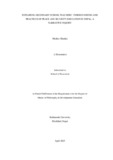
Please use this identifier to cite or link to this item:
https://hdl.handle.net/20.500.14301/543| Title: | Exploring Secondary School Teachers’ Understanding and Practices of Peace and Security Education in Nepal: A Narrative Inquiry. |
| Authors: | Khadka, Madhav |
| Citation: | Khadka, M. (2025). Exploring secondary school teachers’ understanding and practices of peace and security education in Nepal: A narrative inquiry. |
| Issue Date: | Apr-2025 |
| Publisher: | Kathmandu University School of Education |
| School: | SOED |
| Department: | DODE |
| Level: | M.Phil. |
| Program: | MPhil in Development Studies |
| Abstract: | Violence and a sense of insecurity in school spaces have been increasing globally. Integration of peace in school education fosters the value of peace and provides students with a sense of security in school as well. This study explores secondary school teachers’ understanding and practices of peace in school education in Nepal through a narrative inquiry. This study collected the stories of the school teachers on their understanding as well as their practices of peace education. I selected thirteen secondary school teachers teaching in Kathmandu and Bajhang districts as research participants. For collecting stories from the participants, this study has adopted in-depth interviews, observations, and group discussions. The collected narratives from the participants were analysed using structuration theory. This study revealed that school teachers’ understanding of peace and security education is limited due to the lack of adequate exposure to peace and security-related content in their pre-service and in-service trainings. As a result of limited knowledge and skills, mostly, the teachers are using Kanthessori (rote memorization) pedagogical approach and use Dandessori (corporal punishment) against the students who fail to memorize the lessons. The high prevalence of Kanthessori is perpetuating Dandessori in schools, resulting in the schools being an insecure space for many children in Nepal. Teachers understood that the school environment is susceptible to various forms of violence and insecurity and necessitates the value of peace and security education in addressing these issues. While the teachers are unable to connect the structural violence, the issue is the use of the rote learning method instead of child friendly teaching and learning methods in schools. Despite these challenges, school teachers actively engage their students in classroom activities such as promoting diversity, value-based learning, participatory teaching methods, and community involvement based on available resources. Nonetheless, there are still practices like corporal punishment and verbal abuse of the students, especially in rural settings, undermining the principles of peace education. I conclude that Kanthessori is a major obstacle to peace education in Nepali schools. The study concludes the importance of fostering teacher agency by transforming them to follow peaceful, safe and child-friendly pedagogy that is generally presented as Montessori approach, to inculcate peace in the mind of children and in making the school environment peaceful and safe. In addition, teachers should engage with parents, community leaders, local government representatives and the education system. It underscores the need for a policy framework, thematic curriculum integration, and continuous professional development to support teacher agency in Nepal. |
| URI: | https://hdl.handle.net/20.500.14301/543 |
| Appears in Collections: | Dissertations |
Files in This Item:
| File | Description | Size | Format | |
|---|---|---|---|---|
| Madhav Khadka_Final Thesis 07 Aug 2025 (1).pdf | 654.84 kB | Adobe PDF |  View/Open |
Items in DSpace are protected by copyright, with all rights reserved, unless otherwise indicated.